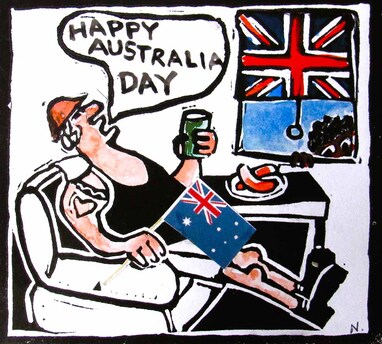 Cartoon: Natasha Williams-Novak
Cartoon: Natasha Williams-Novak ALMOST 60 years after the first fleet sailed in Port Jackson, in 1844 my English great-great-grandfather Samuel Pickersgill was transported to what has been ‘lutruwita’ for thousands of generations, but which the British colonial office called the penal colony of Van Diemen’s Land.
Samuel had stolen two brass taps from a chapel and then attempted to sell them to buy a coat for the winter. It was not his first stealing offence, but presumably his young age of 17 saw him transported rather than hanged. From his record it is clear that while in Van Diemen’s Land he was flogged and subjected to long periods of hard labour and inhumanely cramped solitary confinement.
Of necessity, Samuel and Winifred kept a low profile. Samuel transported goods to the goldfields while Winifred ran a boarding house tent at the Gold Rush tent town which sprang up near the site of what is now the Victorian arts precinct.
Perhaps even then things may have been too dangerous for them, because when they boarded ship for England, it was under one of Samuel’s false names. They eventually returned under Samuel’s real name, on condition that he become an indentured farm labourer on French Island in Western Port. By that time the colonial office and administrators had given him up for dead and nobody cared enough to pursue him.
Samuel and Winifred managed to claw their way out of abject poverty, keep their children alive into adulthood and eventually even own some land. Winifred died knowing that because of her efforts growing and selling vegetables, she had been able to pay a ticket-of-leave man to educate their children. They would not struggle against the stigma and disadvantage of illiteracy as she had done.
However, there can be no doubt that both Samuel and Winifred suffered immensely in their young lives, and fought for much of the rest of their lives against social stigma and also, in Winifred’s case, illiteracy and racism against the Irish. The Pickersgill children themselves also had very tough lives of struggle in the vagaries of late 19th and early 20th century economic crises and contagious disease rampant at the time which took several of their children. But to my knowledge they were not treated like criminals, or shunned by society, and neither were their offspring.
But how different would this situation be for me, as a descendent of the Pickersgills, if the stigma and prejudice that dogged Samuel and Winifred had become intergenerational? If Australian society still forced the descendants of transported convicts and illiterate Irish orphans to relinquish their identities, frequently uproot and move away from their geographic and emotional ancestries, and struggle for every little human right for themselves and their children?
If that was my lived experience, and that of my offspring, would we celebrate the day Samuel arrived as a convict on the transportation vessel, or Winifred arrived on board the ship as an illiterate Irish forced immigrant? Definitely not! Those dates would absolutely be a constant source of trauma for me.
At 16 years of age I became an environmental activist. The older I have become, the more acutely I feel the ongoing destruction of this continent for the sake of some mythical human construct known as GDP. It made me angry as a teenager and makes me even angrier now.
But this is not even my Country. I live on Bunurong Country. I cannot begin to imagine how painful it is for so many Aboriginal and Torres Strait Islander people to see the destruction wrought by colonialism, imperialism and globalisation on their precious Country, sacred sites, their languages, their bio-cultural knowledge, cultural practices, families, health, well-being, and ability to make their own decisions about their lives and their communities. All of that horror and more started on January 26, 1788, when the actual permanent colony commenced. Much of that horror is ongoing.
If it is possible to cast off the colonial prism through which so many see the world, it may also be possible to finally see the current “Australia Day” for what it is. That date may seem to many to mark the start of the great nation we now call Australia. But, to Aboriginal and Torres Strait Islander people, it is the date when invaders commenced a concerted attempt to destroy over 500 great First Nations groups many millennia older, which stood (and still stand) in the way of the colonial juggernaut. For them, that date will always be Invasion Day – but also, definitely, Survival Day.
We all need to ask ourselves: Why do we see ourselves as a great nation? There must be commonalities on the many answers to that question which will enable us to celebrate being “Australian”; to finally establish a true identity, and a date to celebrate that identity that does not scream colonialism and dispossession.
Of course we cannot expect all Aboriginal and Torres Strait people to celebrate any “Australia Day” with us. They are first and foremost members of their own millennia-old nations, and “Australia” is by definition only a colonial overlay.
But surely we can agree to be less blatantly insensitive? To reach a point where we are actually, not just tokenistically, respectful of the Aboriginal and Torres Strait Islander people on whose unceded Country we are so fortunate to live. Time to shed the colonial paradigm. Time to change the date.